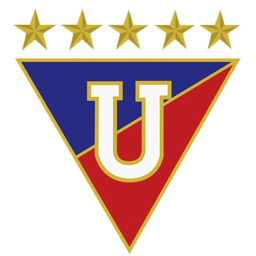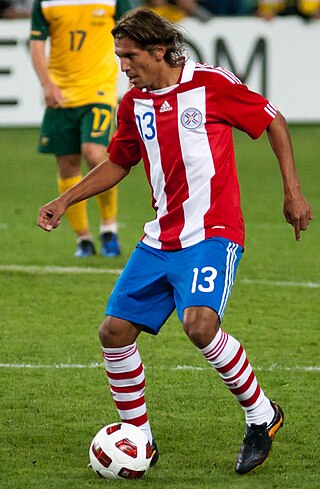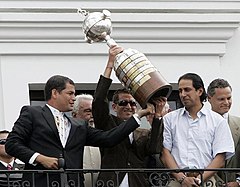
Barcelona Sporting Club, internationally known as Barcelona de Guayaquil, is an Ecuadorian sports club based in Guayaquil, known best for its professional football team. They currently play in the Ecuadorian Serie A, the highest level of football in the country, and hold the distinction of being the only club in the Ecuadorian top flight to not have played in the Serie B.

Liga Deportiva Universitaria, often referred to as LDU Quito, is an Ecuadorian professional football club based in Quito. They play in the Serie A, the highest level of the Ecuadorian professional football league. They play their home games at the Estadio Rodrigo Paz Delgado, more commonly referred to as Casa Blanca. Rival clubs include Quito-based clubs El Nacional, Deportivo Quito, Aucas and Universidad Católica.
Christian Rolando Lara Anangonó, nicknamed Diablito, is an Ecuadorian former footballer who played as a midfielder.

Jaime Iván Kaviedes Llorenty is an Ecuadorian former professional footballer who played as a forward.

Luis Fernando Saritama Padilla is an Ecuadorian former footballer of Japanese descent who played as a midfielder.
Daniel Jimmy Viteri Vinces is an Ecuadoran footballer.

José Francisco Cevallos Villavicencio is an Ecuadorian retired football goalkeeper, former Minister of Sports in Ecuador and former President of Barcelona, the football club where he started his professional career. Nicknamed Las Manos del Ecuador, Cevallos is considered by many to be the greatest goalkeeper in the history of Ecuadorian football. He has won three national titles with Guayaquil based club Barcelona, with whom he has spent the majority of his professional career. As the goalkeeper for LDU Quito, he was a key figure in the team's 2008 Copa Libertadores title, where he saved three penalties in the deciding penalty shoot-out. That same year, he was voted as the Best Goalkeeper in South America by Montevideo based newspaper El País. As a member of the national team, he has participated in four Copa Américas and Ecuador's first World Cup participation. Having represented his national team 89 times, he is the highest capped goalkeeper in the history of the team.
Alfonso Andrés Obregón Cancino is a retired Ecuadorian football player.

Enrique Daniel Vera Torres, nicknamed Rambert, is a Paraguayan football manager and former player who played as a midfielder. He is the current manager of Tacuary.
Claudio Daniel Bieler is an Argentine footballer who plays as a forward for Agropecuario.
Jayro Rolando Campos León is an Ecuadorian former football defender.
The 2008 Copa Libertadores finals was a two-legged football match-up to determine the 2008 Copa Libertadores champion. The series was contested between Liga Deportiva Universitaria de Quito from Quito, Ecuador, and Fluminense Football Club from Rio de Janeiro, Brazil, both of whom were playing in their first finals. The first leg was played at LDU Quito's home field, La Casa Blanca in Quito, Ecuador on 25 June 2008; the second leg was played at Fluminense's home field, Maracanã in Rio de Janeiro, Brazil on 2 July 2008. LDU Quito won the final on penalties 3–1, after each team won a game apiece, and equalized on goal difference after the end of extra-time of the second leg. With this achievement, LDU Quito became the first Ecuadorian club to win a Copa Libertadores title.
Edder Javier Vaca Quinde is an Ecuadorian footballer.

Christian Andrés Suárez Valencia is an Ecuadorian footballer who last played for Guayaquil City.

Pedro Sebastián Larrea Arellano is an Ecuadorian footballer. He plays for Libertad F.C.
Association football is the most popular sport in Ecuador, in line with the majority of South America.
Liga Deportiva Universitaria de Quito's 2008 season is the club's 55th year in professional football, and the 47th in the top level of national football, Ecuador's Serie A.
The 2010 Recopa Sudamericana de Clubes was a two-legged tie that determined the winner of the Recopa Sudamericana, an annual football match between the winners of the previous season's Copa Libertadores and Copa Sudamericana competitions. It was contested between Argentine club Estudiantes de La Plata and LDU Quito from Ecuador. The first leg was played on August 25 in Quito, while the second leg was played in Quilmes due to Estadio Ciudad de La Plata was undergoing renovations. Estudiantes participated in t the Recopa for their first time ever, having qualified by winning the 2009 Copa Libertadores.

Paúl Fernando Carrera Velasteguí, known better as Polo Carrera, is an Ecuadorian retired football player and former manager. He has played for clubs in Ecuador and Uruguay, as well as the Ecuador football team
Liga Deportiva Universitaria de Quito's 2013 season was the club's 83rd year of existence, the 60th year in professional football, and the 52nd in the top level of professional football in Ecuador.









